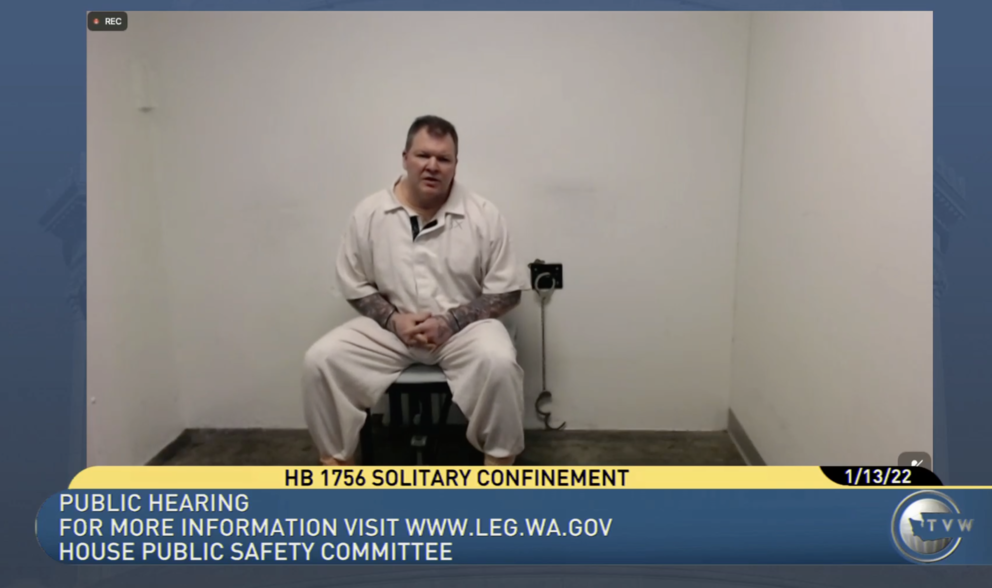“After all these years of spending essentially my entire incarceration housed in Washington state in IMU (intensive management unit), the result of that is you lose hope,” Jarnagin said. “And this situation here creates despair, and that leads to anger and frustration. There’s nothing productive or positive IMU does.”
There are currently no state restrictions on the use of solitary confinement for adults, which is a large part of what HB 1756 hopes to address. Sponsored by state Rep. Strom Peterson, D-Edmonds, the bill also seeks to define the conditions of solitary confinement, which has many different names, including administrative segregation, maximum custody and IMU.
Peterson said he decided to create this bill in part because 95% of currently incarcerated people will be released eventually and work to become members of their communities again. Studies have shown that one of the biggest obstacles to integration is time spent in solitary.
“It’s really important that we release people who are healthy and able to reintegrate into society successfully,” Peterson said.
Peterson doesn’t expect the bill to pass this session, though he intends to pursue similar legislation next year. He infers that the bill stalled due to concerns over lengthy debates that would have been difficult to conclude in this year’s short session.
If HB 1756 were to pass, an incarcerated person may not be placed in solitary except when necessary for emergency purposes, medical isolation or a facilitywide lockdown, or when the incarcerated person elects to go into solitary.
The bill would require that inmates be allowed seven hours of out of cell time for each day spent in solitary, and that the duration of solitary confinement last no more than 15 consecutive days, and no more than 45 cumulative days in a single year.
Peterson pointed out that the general public can likely relate to the harmful impacts of isolation, having lived through nearly two years of the coronavirus pandemic.
“We have seen what can happen in our communities with this isolation.” Peterson said. “Imagine that isolation multiplied by a thousand because you’re stuck in a 10-by- 10-foot room, and then released either back into your community or just out into the general population and how hard that is to manage.”
Many of the currently incarcerated people who testified at the Jan. 13 hearing said their experience in solitary would violate the terms of the bill as it currently stands. Jarnagin has spent the most time in isolation, although the sentiment of his testimony was echoed by other currently incarcerated people.
Daniel Perez, a 35-year-old at the Monroe Correctional Complex, described the complete lack of socialization and stimulation of spending up to 23 hours a day alone in a small cell, and the lasting mental trauma that ensued. Vincent Sherrill, a 50-year-old at Monroe, noted how being placed in solitary made it harder for him to speak with his family on the outside and took away any sense of community.
“I’m not being hyperbolic when I describe the feeling of being removed from the general population in restraints and being placed in solitary confinement,” Sherrill said. “It is a very traumatizing and demonizing experience.”
The state Department of Corrections has said the elimination of solitary confinement is one of its top priorities, and recognizes its harmful impacts. However, the department has major concerns about implementing the specific restrictions that the bill would put into place. Sean Murphy, deputy secretary of correctional operations, said the department’s biggest concern is insufficient housing and staff.
DOC officials estimated that the measure would cost more than $115 million between now and 2025 because of the need to increase staffing and build new facilities. Advocates of the policy change question those numbers, saying they seem too high and do not take into account the long-term cost-saving benefits from the reduced need for mental health treatment.
“As it sits in the bill, we don’t have adequate recreation areas, we don't have adequate program space in those units, we don’t have adequate staff to fill those vacancies needed to make those changes,” Murphy said.
Republican lawmakers have raised similar concerns as the bill has worked its way through the Legislature. State Rep. Gina Mosbrucker, R-Goldendale, the ranking minority member of the House Committee on Public Safety, pointed out several of the logistical issues that led her to vote against the bill in committee.
“A year seems like a very short amount of time in order to put in place a very expensive plan,” Mosbrucker said. “We have a labor shortage in all industries, so who’s going to make sure we have enough correction officers to keep other inmates and staff safe?”
On Feb. 2, the DOC submitted a substitute bill that made several key changes to the original. The substitute bill would reduce required out-of-cell time from seven to four hours a day and removed extra limitations on how long vulnerable populations — including people with acute mental illnesses, disabilities, and those under the age of 25 and over the age of 55 — may be in solitary.
The substitute bill also takes away any restriction on how long maximum custody incarcerated people can be held in solitary confinement. Rachael Seevers, an attorney for Disability Rights Washington, says removing that restriction would take away much of the progress achieved in the original bill.
“From my perspective from my work in the prisons, those folks in maximum custody are exactly the people who are there for the longest period of time,” Seevers said.
According to Jaime Hawk, legal strategy director of the American Civil Liberties Union of Washington, one of the most concerning changes is that it would allow an extension of administrative segregation beyond 15 days, without providing any criteria for how long that extension can be granted.
“DOC has internal guidelines currently, and they just keep holding people in solitary and extending and extending for years at a time,” Hawk said.
Hawk, who has been working with Peterson and the DOC throughout the creation of HB 1756, said the introduction of the substitute bill was the first time the department made clear its concerns about restricting the use of solitary confinement.
“They don’t want to oppose the bill, because people would be really upset about that, and so they keep trying to walk this middle ground and say that they support the spirit of the bill, and have concerns about implementation,” Hawk said.



